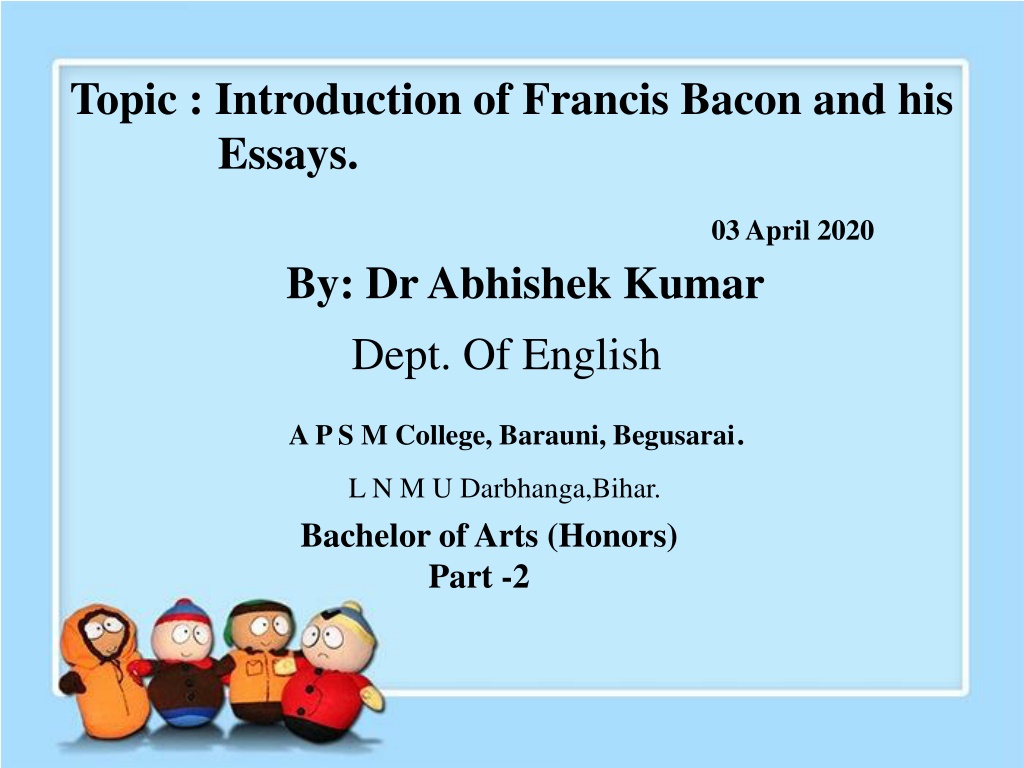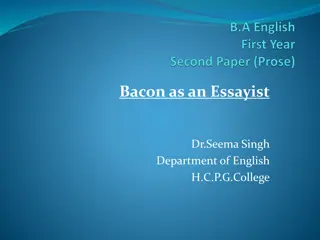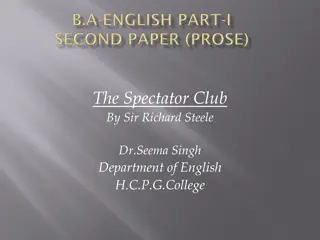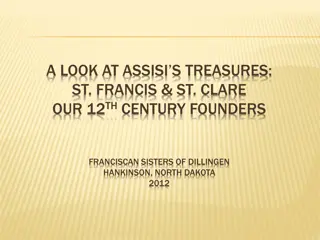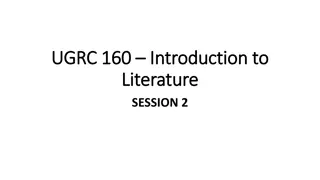Sir Francis Bacon: A Prominent Figure in Writing Prose
Sir Francis Bacon (1561-1626) was a prominent figure known for his distinctive writing style during the Elizabethan and Jacobean Ages. His Essays, first published in 1597 and expanded in 1625, cover a wide range of philosophical, political, moral, and social topics. Bacon's legacy as a scientist, philosopher, and politician is overshadowed by his literary prowess, with some even attributing Shakespeare's plays to him.
Uploaded on Sep 26, 2024 | 0 Views
Download Presentation

Please find below an Image/Link to download the presentation.
The content on the website is provided AS IS for your information and personal use only. It may not be sold, licensed, or shared on other websites without obtaining consent from the author. Download presentation by click this link. If you encounter any issues during the download, it is possible that the publisher has removed the file from their server.
E N D
Presentation Transcript
Topic : Introduction of Francis Bacon and his Essays. 03 April 2020 By: Dr Abhishek Kumar Dept. Of English A P S M College, Barauni, Begusarai. L N M U Darbhanga,Bihar. Bachelor of Arts (Honors) Part -2
Sir Francis Bacon (1561-1626) was a prominent figure who stands as a single figure in writing prose for his distinctive writing style. He was born in the golden age of literature i.e. Elizabethan Age but earned his name and fame in Jacobean Age in the kingdom of King James. He is known, even today, for his consistent efforts in creating an academic setting dedicated to the rigorous and meticulous pursuit of accumulating knowledge. Bacon's rise to political power started in reign the of King James. He ascended the ranks rapidly, becoming Lord Chancellor in 1618- a very high rank in the hierarchical structure of those times. However, he could not keep this for long period. Accusations of bribery led him in jail in 1621 although he spent only four days in jail that resulted him abstain from holing a Member of Parliament or hold any political office.
Sir Francis Bacon first published Essays in 1597. Bacon released a second expanded version of Essays in 1625, and it is this publication that most scholars read today. Consisting of fifty-eight short essays, Bacon's book explores an eclectic mix of philosophical, political, moral, and social questions. In Essays, the title of each composition is succinct and defines the topic of the essay. All except one of Bacon's titles begin with the preposition "Of," followed by the topic under examination in the essay. For example, "Of Truth" explores the objective nature of truth, as "Of Youth and Age" explores the dichotomies between the elderly and the young. "Of Empire" similarly probes the utility and morality of England's burgeoning empire..
Francis Bacon had many accomplishments. He was a scientist, a philosopher, and a politician, and he was adept, too, at taking bribes; for this he had been imprisoned. It is, however, as a literary man that he is perhaps best remembered, a writer so competent with the pen that for decades there have been some persons willing to argue that Bacon wrote the plays attributed to William Shakespeare
